The MPIWG’s new Lise Meitner Research Group “China in the Global System of Science” will take a close and comprehensive look at these developments, with a special interest in exploring the role of the political regime and societal values as environmental factors for science in contemporary China, in international academic cooperation, and in world science.
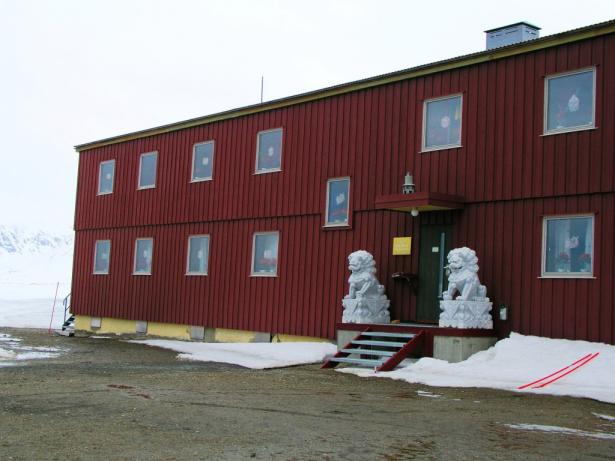
The Arctic Yellow River research station (中国北极黄河站) established 2003 by the Polar Research Institute of China in Ny-Ålesund, Norway. Source: Irene Quaile, iceblog.org, 2020.
The Chinese government and the Communist Party (CCP) leadership have, with increasing vehemence in recent years, formulated their ambition to make China a leading scientific power, calling for a massive increase in Chinese contributions to the global system of science. Compared to the plans for the modernization of science, technology, and education that were formulated since the start of China’s Reform & Opening policy in 1978, the current policies and measures are even more comprehensive and diverse. Furthermore, they re-emphasize the necessity of indigenous contributions and go beyond mere techno-nationalism, calling for an increase in Chinese input across the disciplines, including a “system of philosophy and social sciences with Chinese characteristics that incorporates the country’s socialist practices.”
Science as a Political Value
At the same time, there are also signs of a growing significance of “true” scientific analyses, especially in micro-political contexts in China—in other words, a re-entry of science as a value in itself and for the political process. This is in a society that traditionally valued knowledge and scientific authority, but where modern science was always subordinated to politics and ideology following the beginning of CCP rule in the mid-twentieth century. The degree to which scholars are now consulted and take part in local governments’ policy and governance innovations, or the increasingly heavy references to very specific scientific studies and data in public protests against environmental pollution, are just two examples of this apparent trend.
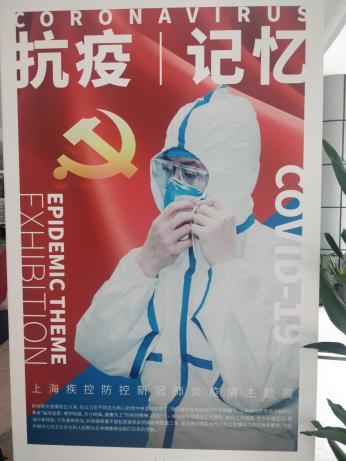
Poster advertising an exhibition at the Shanghai Center for Disease Control on epidemics including Covid-19. Source: Tom Hancock @hancocktom, 2020.
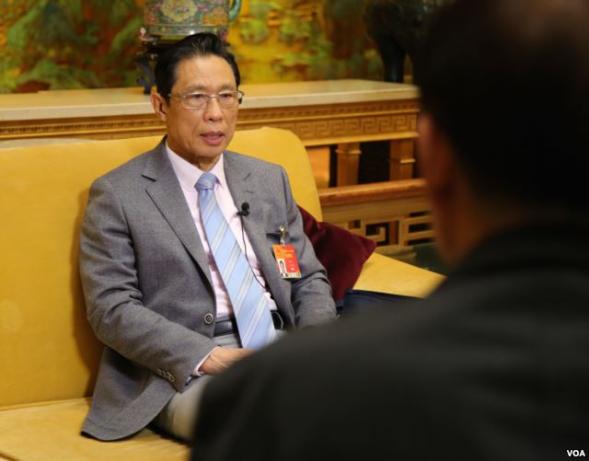
Pulmonologist Nanshan Zhong (钟南山), the face of China’s Covid-19 containment efforts and public celebrity, in an interview. Source: Fang Dong (Reporter, Voice of America), 2020.
Analyzing and Understanding Developments in Science in China
Beyond accurately mapping the structures, dimensions, and norms of contemporary science policy in China in general, and tracing the forms and effects of science-politics and science-regime interfaces, this Lise Meitner Research Group seeks to analyze and understand the current developments in all their complexity. This will include, for instance, explorations of the attempts at both political and non-political steering versus the agency of scientific communities, networks, and individuals in China and in international cooperation. One only has to look at the early stages of the Covid-19 pandemic in China to observe interesting paradoxes: at the same time that scientific analyses and the publication of information about the emerging disease were (and are) heavily politically controlled in China, Chinese scientists were working tirelessly, instantly publishing first results and sharing data widely with colleagues around the world and through all sorts of scientific channels and collaborations.
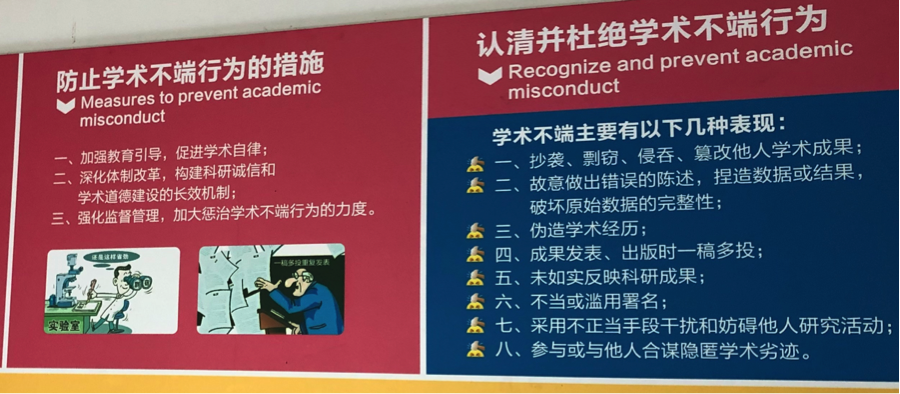
Public poster warning about academic misconduct at a renowned Chinese university, 2019. Source: Anna L. Ahlers.
A further question is what other societal standards, ethics, and principles are at play when we observe convergence or divergence of scientific practice in China and other world regions. Cases of researchers who relocate to China with an expectation of finding seemingly unconstrained opportunities to experiment regularly attract media attention. If this greater freedom does indeed exist, is it due to conscious political strategies of creating a Standortvorteil (“location advantage”) for science in China, or could it actually be based on different research ethics or societal attitudes toward what should be morally and legally permitted (e.g., animal testing) in order to enable scientific progress?
A Sociology of Science Perspective
Unlike the rich insights produced by studies in the history of science and technology and about epistemology and the evolution of specific scientific disciplines in China—many of which are conducted by colleagues here at the MPIWG—it seems we merely possess an anecdotal and mainly quantitative understanding of the most recent developments in the science system of China and its global integration. The research group seeks to tie in here and will apply an explicit sociology of science perspective in that it focuses especially on societal environments for science in contemporary China. This is also where we expect to contribute to comparative research and theory that goes beyond China as “a case,” as formulated, for instance, in our collective project "The Merton Project: Science and Political Regimes in the 21st Century." Scholars in this interdisciplinary research group will explore the many facets of China’s stunning ascent in the system of science in recent decades, both qualitatively and quantitatively, in both national and local, and in its global dimensions. The term “science” here is used inclusively and encompasses all scientific disciplines, including the social sciences and humanities.
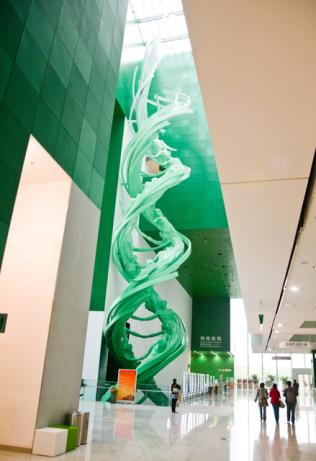
DNA helix sculpture, China Science & Technology Museum, Beijing. Source: Mitch Altman (Flickr, CC-BY-SA 2.0), 2011.

Souvenir with Einstein quote on freedom of teaching, for sale in the Shanghai World Expo Museum, on the occasion of the Albert Einstein: Life in Four Dimensions exhibition, August 2–October 22, 2019 (Photo: Anna L. Ahlers).
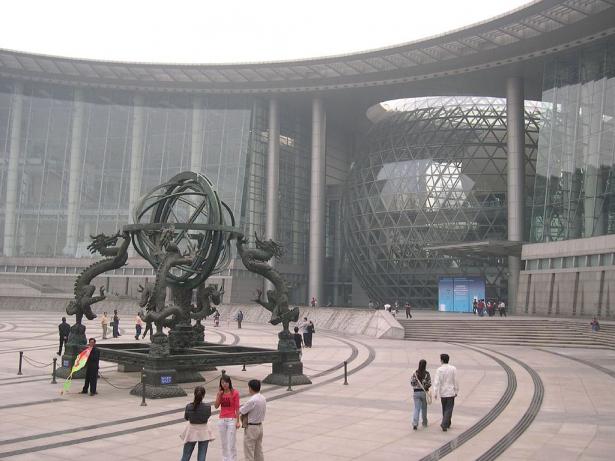
Public square in front of the Shanghai Science & Technology Museum. Source: Carsten Ullrich, 2007.
Challenges and Expectations
Drafting such a wide research framework does not come without challenges, of course. Projects in this research group act on the assumption of science as a global function system, which implies shared institutions, goals, organizations, inclusion formulas, networks, and many more elements that constitute the structures of the system of science and blur nationalities and borders. It will therefore be a major requirement for studies conducted in the group to operate with utmost caution, by clarifying continually what China or Chinese actually means in this context, and whether this categorization is derived from self-conceptualization or ascription. Does it mean scientific activity that originates in China, or is produced by participants in the global system of science who conceive of themselves as Chinese (for example, by citizenship or descent) or are identified as Chinese by other participants, or by those who are affiliated with institutions in the PR China? Finally, although the research group will focus on contemporary Chinese society, each study will aim at representing an exhaustive analysis, which will naturally include historical perspectives.
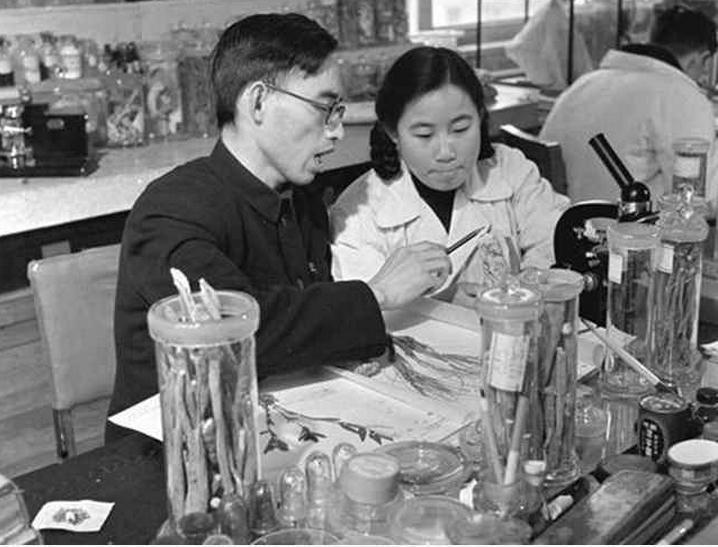
Chinese Nobel Prize-winning scientist Youyou Tu (屠呦呦, right) and tutor Zhicen Lou (楼之岑, left) at the China Academy of Chinese Medical Sciences. Source: Xinhua, undated (1950s).
First Research Projects
Among the first projects pursued by individual group members are a study of how Chinese polar scientists navigate between research and diplomacy, an analysis of the internationalization strategies of Chinese universities, an exploration of the role of science and scholars in Chinese local governance, and an investigation into the seeming interrelatedness of political initiatives and the evolution of new scientific disciplines and communities in China. The group will also work on joint publication projects, such as Gauging China’s Global Scientific Expansion and Science and Democratic and Authoritarian Social Structures (working titles) and looks forward to hosting visiting researchers and workshops at the MPIWG.
